- Home
- Hanna Hamilton
A Dashing Duke for Emily
A Dashing Duke for Emily Read online
A Dashing Duke for Emily
A Historical Regency Romance Novel
Hanna Hamilton
Edited by
Maggie Berry
Contents
A Thank You Gift
About the Book
Chapter 1
Chapter 2
Chapter 3
Chapter 4
Chapter 5
Chapter 6
Chapter 7
Chapter 8
Chapter 9
Chapter 10
Chapter 11
Chapter 12
Chapter 13
Chapter 14
Chapter 15
Chapter 16
Chapter 17
Chapter 18
Chapter 19
Chapter 20
Chapter 21
Chapter 22
Chapter 23
Chapter 24
Chapter 25
Chapter 26
Chapter 27
Chapter 28
Chapter 29
Chapter 30
Chapter 31
Chapter 32
Chapter 33
Chapter 34
Chapter 35
Epilogue
Diana Adores the Puzzled Earl
Chapter 1
Chapter 2
Chapter 3
Chapter 4
Also by Hanna Hamilton
About the Author
A Thank You Gift
Thanks a lot for purchasing my book. It really means a lot to me, because this is the best way to show me your love.
As a Thank You gift I have written a full length novel for you called A True Lady. It’s only available to people who have downloaded one of my books and you can get your free copy by tapping this link here.
Once more, thanks a lot for your love and support.
Hanna Hamilton
About the Book
A daring choice between career and love that will seal her fate forever…
Emily Dunn is the star pianist in her musical family. She is surprised when Mark Linfield, the handsome and powerful Duke of Edgerton, and his Uncle Silas invite her and her sisters to supper together.
Both Mark and his uncle are smitten with the elegant, statuesque Emily, and the Duke, a patron of the arts, suggests he would like to help launch her career as a solo pianist throughout Europe.
Silas wants to help Emily too, but only if she will agree to accept his advances toward her. And not only must she contend with Silas, but there are forces within her own family that want to prevent her from achieving her dream.
Despite these difficulties Mark and Emily, are becoming intensely attracted to each other. But she has a beau, and his family wants him to marry a woman of his social class.
Neither one is certain how to deal with these challenges by themselves. But might they succeed together, or will they be overpowered by the forces working against them?
Chapter 1
No, no, no… Try it again. You are rushing the adagio—lentamente, lentamente, Cara. Use the space between the notes. Make the silences an aspect of the music.”
Giles Carter paced his studio in front of the piano where Emily Dunn, his protégé, was practicing the Mozart Fantasia in C minor. Giles, while English born, liked to affect an Italian persona and often used Italian phrases when teaching. He was in his early fifties, very thin, with a prominent aquiline nose, and affected the long hair, dress, and mannerisms of a romantic artist in this year of eighteen-forty-one.
Emily had the habit of biting her lower lip when she was intensely concentrating. “Presentation, remember how you appear to the audience,” he said. Giles had been trying to break her of this habit and went over and lightly tapped her upper lip with his baton, which he carried with him at all times when he was teaching.
Emily stopped and wiped her brow with the handkerchief she kept for that purpose as it was an unusually warm May day.
“I understand what you mean about space between the notes. And now I am trying to get the feel of it into my body so that it becomes second nature. Music is not only the notes but the silences—and this piece, in particular, longs to be drawn out and flow lushly over the listener like a meandering stream. Is that not so?”
“Esattamente,” Giles declared as he threw his hands joyously up in the air.
Emily began playing from the beginning of the piece, once again. She smiled and swayed as she began to integrate Giles’s instruction into her playing.
Emily had a commanding stage presence. She was aristocratically beautiful—stately and tall. Her dark hair was pulled tightly away from her face and fastened in a tight bun at the back of her head. She had intelligent, piercing eyes and she moved with precision and grace. She generally appeared to be more mature and composed than her six and twenty years.
It was highly unusual for women to be performing music in public performances, but Emily and her two sisters, Ruth and Teresa, had become quite the London sensations—some might even say scandals. But Emily, in particular, was becoming recognized as a virtuoso, ably but, less spectacularly, supported by her sisters on the cello and oboe.
Emily finished the piece without Giles stopping her. It was a magical performance, and even Giles was hushed and moved by her exquisite rendition.
“Brava, brava, Carissima. If you perform it that way at the concert, you will have London at your feet.”
“Thank you, Giles. I must say, it did feel good.”
“And what time are your sisters coming?”
“At two I believe. We need to work on the Rameau, particularly. Ruth is too hesitant on the cello part,” Emily insisted.
Giles was thoughtful, tapping the baton in the palm of his hand. “Emily, I know your father does not want to hear this, but if you ever want to excel as a solo performer, you must break out on your own. Your sisters are holding you back. You do understand that, do you not?”
Emily hung her head, lost in thought, before saying, “I know, but we have been a family trio since we started out together. It is very difficult for me to break free. And deep down I know my father feels that, if I leave, Ruth and Teresa will be left behind with no musical careers of their own.”
“That may sadly be true,” Giles said, gathering up the sheet music and piling it neatly atop the piano while wistfully looking out the studio windows at a small park. “But you have the potential for a stellar career, Emily, and it would be a monstrous shame if you did not take advantage of the opportunity.”
Emily sighed and came over and put her hand on Giles’s arm. “Give me a little more time. Let us get through this next concert, and then I will have a word with Papa and see if there might be another way.”
“Let me know if I can help. My advocacy on your behalf might help sway him.”
They could hear the sister’s climbing the stairs to Giles’s loft, and soon the door opened and Ruth and Teresa entered carrying their instruments.
“We are not late, are we?” Teresa asked, opening her oboe case as Ruth removed the cover protecting her cello.
“Not at all,” Emily said arranging two chairs near the piano.
“Papa was just dreadful about taking out the carriage this afternoon to bring us here, and he grumbled all the way over,” Ruth said.
“He still doesn’t see why we cannot practice at home,” Teresa said.
“He knows our piano is not up to a professional standard and if we are to have a grand concert, we must rehearse properly,” Emily answered.
“Come along now,” Giles insisted, tapping his baton on the piano. “Let us not waste any time. First the Rameau and then the Beethoven.”
The sisters settled into their places and the rehearsal got underway
.
Owen Dunn ran the premier London shop selling musical instruments. His trade consisted mostly of beginning instruments for children being urged by their parents to take up the study of music. But he also carried a line of expensive quality instruments, and he had contacts throughout the continent that could locate rare, antique, and highly prized instruments for the discerning professional.
From an early age, and after discovering he would never be a successful musician, Owen began working at Cartwright & Phillips Musical Instruments in Knightsbridge. He quickly became the shop’s most successful salesman, and by the age of thirty he had bought out the aging owners, but kept the name as it was so well known as the place to purchase quality musical instruments.
Owen dreamed of having a son who might become a virtuoso in the London musical world. But he ended up with three daughters—lovely as the days of spring—but restricted by their sex in the all-male world of British classical music. But he was undeterred and proceeded to train his daughters as musicians with the idea of creating a successful trio.
The family lived in a tidy, modest Georgian-style house in Knightsbridge on a quiet side street not far from the shop.
Breakfast was always a hectic affair. There was no set time, and the family members arrived if and when they felt like it. Except that Mother was usually first.
Teresa, who loved to read, would be early and sit at the table drinking tea and nibbling from her plate while engrossed in the latest novel. She wore thick eyeglasses and was hunched over as she turned the pages with her greasy fingers.
Teresa was the plainest of the sisters. Today she had her hair parted down the middle braided and coiled on either side of her head. She gave little attention to her appearance and wore no blush, rouge, or lipstick. Occasionally her mother would come over and pinch her cheeks in an effort to get a little color in them.
Papa was usually the next to arrive, as he needed to open the shop, and liked to be early so he could get a little work done in the back office before he was inundated with customers.
He came in this morning and sat down as Molly, their only domestic besides the cook, poured his tea.
Owen looked up and glowered at his plain daughter.
“How are you ever going to be a first-class performer looking like that?” he groused.
Teresa blankly looked up, still in the world of her novel. “Papa, what are you talking about? How do I look?”
“Like a bedraggled, rain-soaked cat.”
Teresa pushed up her eyeglasses that had scooted down her nose and stared at him like he was speaking Turkish.
“I am not wet,” she replied blandly. “I have no idea what you are talking about.”
Emily was the next to breeze into the dining room, quickly followed by Ruth who was fiddling with the lace on her left sleeve. Ruth had lovely auburn hair and green eyes with a fair, milky complexion. She resembled her mother more than the other two girls.
“I do not suppose anyone has a needle and cotton do you? I must have caught my sleeve on that infernal stair railing again,” Ruth said as she sat at her place at the table.
“Not at breakfast, dear,” Mother said. “Change your dress after breakfast and give it to Molly to mend.”
Ruth sighed as she sat down. “I will do it. Molly always takes forever.”
“Well, she has other responsibilities, too. And, as you know, we are in no position to have a personal lady’s maid in this house.”
“As we are all too aware,” Ruth said, playing with her cutlery as Molly poured her tea, sticking out her tongue behind Ruth’s back.
Ruth always thought of herself as more attractive than her younger sister, Teresa. But she seemed to have a perpetually sour expression, as she was always complaining about something and, although she was often approached by young men interested in courting her, she inevitably sent them scurrying away with her grouchy attitudes.
Emily, as the eldest, attempted to stay out of the family’s petty squabbles and tried to lead by example with her calm demeanor. However, both sisters thought she was a bit haughty and full of herself. But then, they did not have the same drive to succeed as she did—or the same talent.
After Emily received her breakfast, Mother asked, “Whatever happened to that nice gentleman who called on you last week? What is his name? He seemed to be very nice.”
“Yes, Raymond Howard. He scurried away as soon as he found out I did not have any money.”
“But he seemed so very nice,” Mother lamented.
“No, Mother, he was not. He was like so many men I meet—a hanger-on. He was mesmerized by the glamour of me being a successful musician—and something of a novelty.”
Papa looked up from his rasher of bacon and eggs. “You do seem to attract a lot of those types, do you not, my dear?”
Emily sighed. “It is difficult to find a genuine suitor with my constant rehearsals and performing schedule. They all want to either take me out to tea or to the theatre, but I am rarely available for any of those events.”
Mother frowned. “You work too hard. You need to set aside time for romance, or you will find yourself an old maid with no future.”
Now their father pounced. “Mother, her future is in performing. She… and the other girls too… are destined for greatness. How can marriage possibly stand up to such splendid musical accomplishments?”
“Speaking of which,” Emily said as she rose from her place at the table. “I must practice. If you will excuse me…”
“Well, I am going too, but to wash my hair.” Ruth insisted. “You work far too hard, Emily. And I intend to have a real life, thank you very much.” She stood up and left the dining room before Emily.
Papa caught Emily’s gaze and whispered as she passed. “I do wish your sisters were as dedicated as you are.”
Emily patted her father’s shoulder. “There must be allowances for all of our differences, Papa.”
After Emily left, Teresa looked up from her book. “Is there any more toast? I do love this marmalade.”
Chapter 2
Mark Linfield, the young Duke of Edgerton, sat at his father’s bedside and reached over and took the old man’s hand. His father had been asleep but, at his son’s touch, he opened his eyes.
“Son?
“How are you doing this morning, Father?”
His father winced. “About the same. What time is Doctor Benson coming? Did he say?”
“He usually comes about ten.”
Jacob, Mark’s father, closed his eyes again.
“Father, I wanted a word with you about the Cape Colony trade.”
Opening his eyes, Jacob said, “Mark, I am sorry not to be of better use to you, but I just cannot deal with those issues anymore. That is why I passed the dukedom on to you. Please, leave me in peace.”
“As you wish, Father,” Mark replied, and he stood to leave.
“Maybe your grandmother might have some thoughts about the Cape Colony business. She always seemed to have a head for business, but she is a bit of a dotter these days. But have a chat with her.”
“I will—thank you.”
As Mark turned to leave, his father stopped him by waving his hand. “And have the doctor sent up as soon as he arrives.”
“I will.”
It was unusual for a living duke to pass on the dukedom to his son while he was still alive, but Jacob Linfield was no ordinary duke. He had been aggressive in business in his active years, and he had amassed a vast family fortune in trade while, at the same time, being an eager supporter of the arts—especially music. But when his health rapidly declined, he turned his entire estate and title over to his son Mark.
Linfield House and Park were situated just outside of London in Essex, near the small market town of Chipping Ongar. It was a convenient location because it had ready access to London where Mark could conveniently manage the estate’s business interests.
One approached Linfield house from the right side—the drive leading through a l
ush green lawn and past two welcoming monuments to the right front corner where a single-story entrance led into the two-story French chateau-style house. Mansard and conical shaped roofs covered turrets and towers along the front and sides of this yellow sandstone building, surrounded by expansive lawns with beautifully placed, stately trees.

 Before I Was Yours, My Earl: A Historical Regency Romance Novel
Before I Was Yours, My Earl: A Historical Regency Romance Novel The Stolen Diadem of a Castaway Lady: A Historical Regency Romance Novel
The Stolen Diadem of a Castaway Lady: A Historical Regency Romance Novel The Earl That Overruled My Destiny
The Earl That Overruled My Destiny Annabelle Enchants the Rejected Earl: A Historical Regency Romance Novel
Annabelle Enchants the Rejected Earl: A Historical Regency Romance Novel Diana Adores the Puzzled Duke_A Historical Regency Romance Novel
Diana Adores the Puzzled Duke_A Historical Regency Romance Novel The Duke of My Heart (Regency Romance)
The Duke of My Heart (Regency Romance)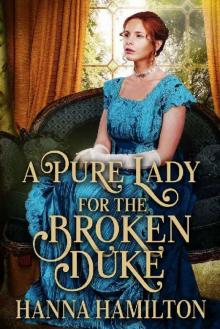 A Pure Lady for the Broken Duke
A Pure Lady for the Broken Duke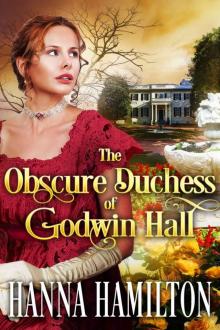 The Obscure Duchess of Godwin Hall_A Historical Regency Romance Novel
The Obscure Duchess of Godwin Hall_A Historical Regency Romance Novel A Charming Cavalryman for Clementine_A Historical Romance Novel Based on True Events
A Charming Cavalryman for Clementine_A Historical Romance Novel Based on True Events The Governess Who Stole My Heart: A Historical Regency Romance Novel
The Governess Who Stole My Heart: A Historical Regency Romance Novel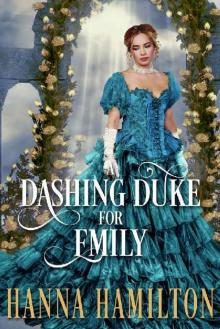 A Dashing Duke for Emily_A Historical Regency Romance Novel
A Dashing Duke for Emily_A Historical Regency Romance Novel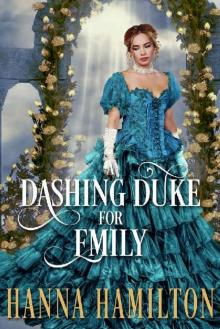 A Dashing Duke for Emily
A Dashing Duke for Emily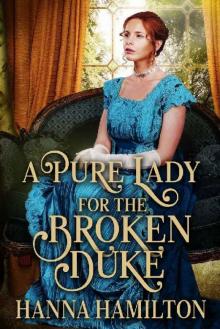 A Pure Lady for the Broken Duke_A Historical Regency Romance Novel
A Pure Lady for the Broken Duke_A Historical Regency Romance Novel The Scandal of the Deceived Duchess: A Historical Regency Romance Novel
The Scandal of the Deceived Duchess: A Historical Regency Romance Novel The Legend of the Betrayed Duchess_A Historical Regency Romance Novel
The Legend of the Betrayed Duchess_A Historical Regency Romance Novel The Scandalous Saga of the White Lady: A Historical Regency Romance Novel
The Scandalous Saga of the White Lady: A Historical Regency Romance Novel